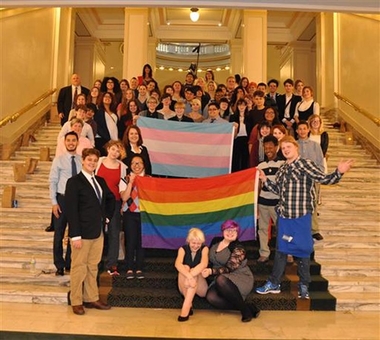'It doesn't make any sense' Activist reacts to legislation

By Emily Summars
Staff Writer, The Enid News
Several pieces of legislation placed Oklahoma as No. 1 in the nation for discrimination bills against lesbian, gay, bisexual and transgender individuals, according to officials with the Human Rights Campaign.
Catching national attention, more than 27 bills are eligible to be heard this session that could negatively impact the LGBT community. Oklahoma's legislative session begins Monday.
“Oklahoma is regrettably leading the nation in the number of bills attacking LGBT people, their families, and visitors in the 2016 legislative session,” said HRC Legal Director Sarah Warbelow. “These vile attacks are shameful, far reaching, and would no doubt be incredibly destructive to this great state — resulting in multiple, expensive legal challenges and a greatly damaged reputation.”
House Bill 3044, by Rep. Sally Kern, R-Oklahoma City, has gained the interest of local LGBT activists.
HB 3044 would prohibit school counselors, therapists or any public school official from referring a student to information on human sexuality without notifying the legal guardian prior to the referral.
"In Garfield County and northwest Oklahoma, we have a lot of LGBT youth that need to talk about issues," said Cynthia Stevison.
Stevison serves a chair of Enid LGBT Coalition, but she said er viewpoints are her personal opinions and do not reflect the views of Enid LGBT Coalition.
"It doesn't make any sense why you would want to pass a law that would prohibit a counselor from talking to a student about anything that is bothering them, whatever it is that is bothering them," she said. "Why would you want to limit what counselors want to talk about?"
Suicide is the leading cause of death among people ages 10 to 24, according to the Centers for Disease Control.
U.S. Department of Health and Human Services reports LGB youth are four times more likely to attempt suicide as their straight peers. Questioning youth are three times more likely.
"There aren't a lot of outlets and places in rural Oklahoma for young people to get their questions answered," said Troy Stevenson, Freedom Oklahoma executive director.
Freedom Oklahoma is a 501(c)4 focused on protecting freedom for all Oklahomans.
"Usually the only outlet is a school counselor or teacher," he said. "This bill would bar them (district employees) from being allowed to talk to students about anything dealing with sexuality."
Stevison said Enid has become more accepting in the past 10 years, but Kern's bill prevents counselors from doing their job.
Stevison said Oklahomans should be aware how such legislation, if passed, it would impact families.
Stevenson agrees. He said if any of the 27 bills discriminating against LGBT people passes — the bills will be challenged in court.
Other bills filed include House Joint Resolution 1059, Rep. Mark McCullough, R-Tulsa, which would allow any religious organization, private business or individual to refuse service if it violates a religious belief.
Senate Bill 898, by Sen. Josh Brecheen, R-Coalgate, would allow an individual to obtain relief if their exercise of religion was "substantially burdened."
Senate Bill 440, by Sen. Joseph Silk, R-Broken Bow, creates the Religious Freedom Restoration Act of 2015, allowing individuals and religious entities to refuse service based on religious beliefs.
All four pieces of legislation are similar to a law created by Indiana last year.
Stevenson said that could become less of a civil rights issue and more an economic problem.
Indiana's governor signed the Religious Freedom Restoration Act into law March 2015. The act drew opposition from critics who stated it allowed businesses to refuse service togays and lesbians, according to National Public Radio.
A gaming convention threatened to take its $50 million economic impact to another city, leaving Indiana. A tech company, Salesforce, promised to reduce its investment in the state, according to USA Today network newspaper IndyStar.
By the beginning of April 2015, the act was amended, barring discrimination based on factors like race, religion, sexual orientation and gender identity.
"There are corporations that didn't move to Indiana last year and they lost all kinds of conference revenue," Stevenson said. "They lost more than $60 million in just tourism because of passing these (anti-LGBT) laws."
Stevenson said if a company has the choice between Oklahoma City and San Diego, and its employee base consists primarily of LGBT individuals, it won't come to Oklahoma.
"They're going to be hard pressed to come to a city where their employees are going to be denied a quality of life," he said.
Stevison said Oklahoma is not the worst state, but it isn't the best state, either.
"Every day I don't face discrimination, but I have faced discrimination in Enid before," she said. "It's better than it was five year's ago, it's better than it was 10 years ago, but we can do a better job in this community by loving our neighbors and being kinder to others."
Stevison said that is Enid LGBT Coalition's mission — communicate, connect, contribute. The organization does not support, or get involved in political statements or politics, because of its 501(c)3 nonprofit status.
The organization does volunteer in Enid, educates and it provides resources for LGBT individuals.
"I live more free because I live in a small community, I think personally, because people know me and they know it's not just political," she said. "It's not about kindness and human rights."
Copyright 2016 by Enidnews.com.
For a list of the anti-LGBT bills introduced in the Oklahoma Legislature, visit www.gayly.com/nationally-unprecedented-slate-25-discriminatory-bills-filed-oklahoma.
The Gayly – January 28, 2016 @ 8:10 a.m.





